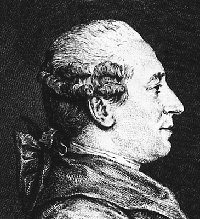Pierre-Augustin Caron de Beaumarchais (1732-99) was one of the great self-made men of 18th century Europe. Trained as a watchmaker, he rose through the ranks of French nobility to become a successful inventor, businessman, publisher and diplomat, even supplying weapons and provisions to American revolutionaries.

Pierre-Augustin Caron de Beaumarchais
Yet Beaumarchais is probably best remembered for his semi-autobiographical Figaro plays, two of which — The Marriage of Figaro (1778) and The Barber of Seville (1773) — would form the basis for celebrated operas by Wolfgang Amadeus Mozart (1756-91) and Gioacchino Rossini (1792-1868), respectively.
At 8 p.m. Friday and Saturday, Dec. 11 and 12, the Washington University Opera will present a condensed version of Beaumarchais’ stories through a series of excerpts from both operas.
Performances — sponsored by the Department of Music in Arts & Sciences — are free and open to the public and take place in Karl Umrath Hall, located just north of the Mallinckrodt Student Center, 6445 Forsyth Blvd. For more information, call (314) 935-5566 or email kschultz@wustl.edu.
Though Beaumarchais’ The Marriage of Figaro was initially banned in Vienna, due to its satiric depiction of the aristocracy, Mozart’s adaptation, written in 1784, was among the composer’s most successful works and today forms a cornerstone of the operatic repertoire. The plot centers on a battle of wits between Figaro, a clever valet, and his bullying master, Count Almaviva, who has designs on Figaro’s betrothed, Susanna.
“Mozart and his librettist, Lorenzo da Ponte, created what for many is the greatest opera ever written,” says Jolly Stewart, director of the Washington University Opera. “The wit, intrigue, political statements and marvelous character delineation is unsurpassed in all of music.”
Rossini adapted The Barber of Seville in 1816, some three decades after Mozart’s opera, though the story is set several years before. It finds Figaro aiding a younger and more romantic Almaviva as he attempts to win the heart of the beautiful Rosina. Yet Rosina is kept locked away by her guardian, Doctor Bartolo, who intends to marry her himself.
“Rossini added to the Figaro story by going backwards for us to hear and see how Figaro arrived at the point we see him in the Mozart,” Stewart points out. “It is logical therefore to bring the two operas together for an audience to hear how each of these composers delights us with his own particular rendering of Figaro’s story.”
John Stewart, director of vocal activities in the Department of Music, will conduct the performance, which will feature 14 undergraduate and graduate singers.
Beaumarchais, like his fictional hero, was born into humble circumstances but found a measure of fame in 1753 after inventing a revolutionary clockwork mechanism. Though the royal watchmaker attempted to claim credit for the design, Beaumarchais prevailed in a series of lawsuits and eventually was awarded a patent by the French Academy of Sciences. He then received several royal commissions and later was appointed music teacher to the daughters of King Louis XVI. His subsequent career would include a number of political and financial intrigues, from which he ultimately emerged a very wealthy man.
Beaumarchais’s early plays were performed privately at the salon of his friend Charles Lenormand d’Étoiles (whose wife, Madame de Pompadour, was a mistress to the king). The characters of Figaro and Almaviva were most likely conceived in 1764-65, during Beaumarchais’ travels to Spain. The Barber of Seville, initially intended as a comic opera, was written in 1773 and received its public premiere two years later. The Marriage of Figaro was written in 1778 but relegated to private readings until 1783, when the king finally granted permission for a stage production.
|
WHO: Washington University Opera WHAT: Excerpts from The Marriage of Figaro by Wolfgang Amadeus Mozart and The Barber of Seville by Gioacchino Rossini. Directed by Jolly Stewart WHEN: 8 p.m. Friday and Saturday, Dec. 11 and 12 WHERE: Karl Umrath Hall Lounge, just north of Mallinckrodt Student Center, 6445 Forsyth Blvd. COST: Free INFORMATION: (314) 935-5566 or kschultz@wustl.edu. SPONSOR: Department of Music in Arts & Sciences |